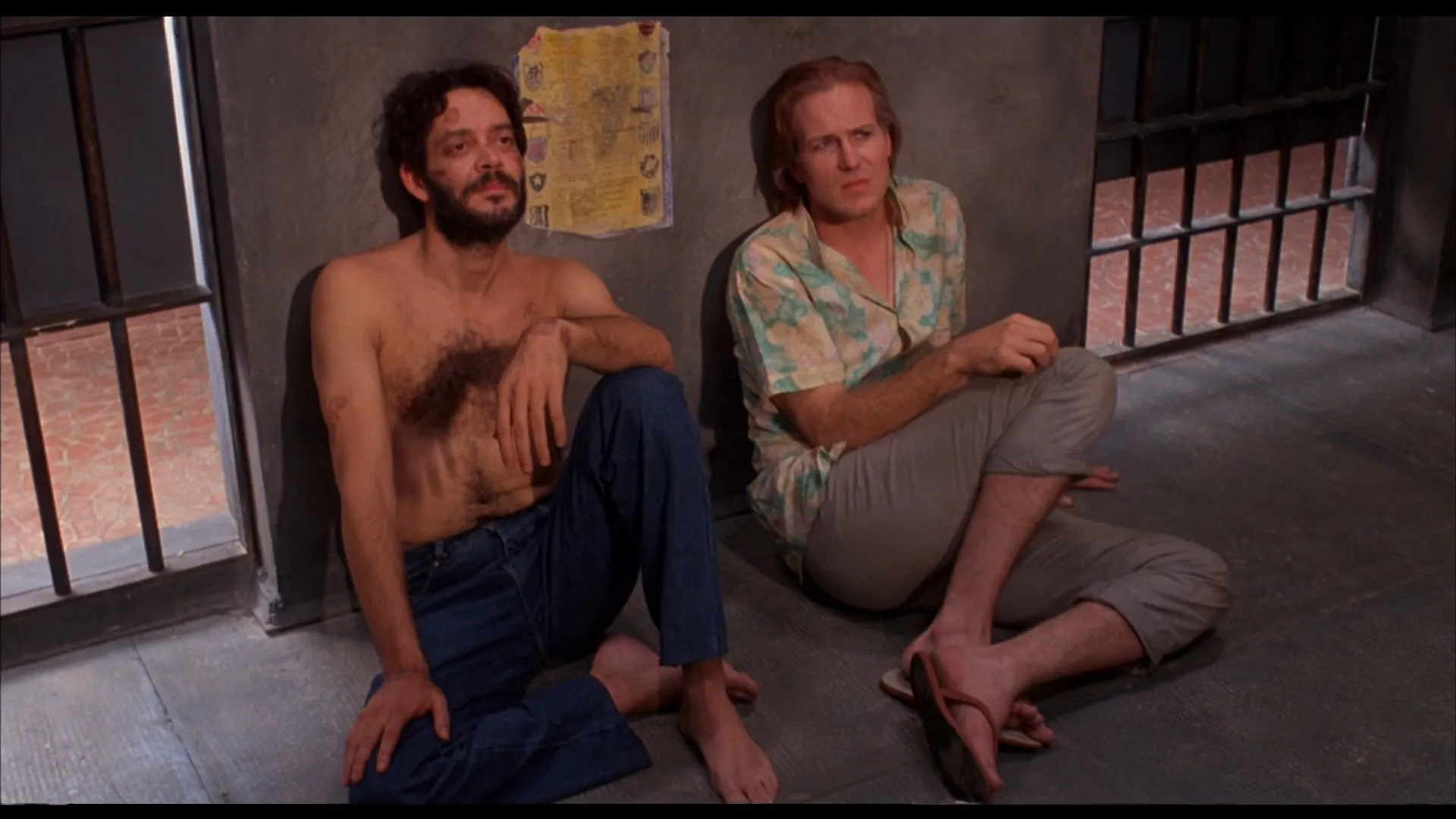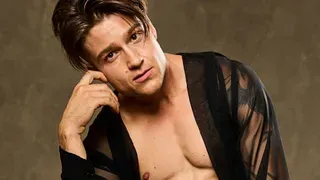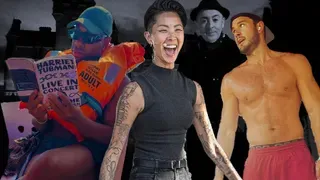June 1, 2018
Art and Titillation :: Bruce LaBruce on 'The Misandrists'
Kilian Melloy READ TIME: 6 MIN.
You might recall film auteur Bruce LaBruce as the maker of 2008's "Otto: or, Up With Dead People," about a gay zombie. Or possibly you saw his 2013 gay romance "Gerontophilia," written by novelist Daniel Allen Cox, in which a young man with a love of older guys meets his partner at an assisted living facility. Or, more likely, you'll remember him as the driving force behind 2004's "The Raspberry Reich," in which LaBruce satirized the radical left. It's likely, in any case, that if you watch porn you'll have seen some of his work in that genre... though you're liable to see a little porn in anything the director helms.
LaBruce has now followed up on "The Raspberry Reich" with "The Misandrists," a film set in a school for wayward girls – a school run by a lesbian separatist radical disguised as a nun and planning an assault against the patriarchy. When a male resistance fighter stumbles onto their enclave and is secreted away in the school's basement, the stage is set for the revolution to begin at home... if that is, a tangle of romantic relationships and political agendas can be sorted out.
EDGE caught up with LaBruce to talk about the uses of porn in films of other (or many) genres, the problems of extremism, and just what a "misandrist" is, anyway.
EDGE: The movie we're discussing is called "The Misandrists," which as it turns out is not a neologism; you did not invent that word. We just don't hear it much.
Bruce LaBruce: The point of calling it "The Misandrists" was that everyone knows what a misogynist is; it's part of the popular vocabulary. But when I confront them with my title, a lot of people don't seem to know that there's also a word for "man-hating," not just "woman-hating." That probably says something about our culture in general.
EDGE: You've said that "The Misandrists" is sort of a sequel to "The Raspberry Reich," which may be one of your more famous films.
Bruce LaBruce: It's one of my more culty films. "The Raspberry Reich" was a critique of radical chic, it was a critique of the radical left – a kind of affectionate critique [by way of] the revolutionary project that the terrorists have in that movie. I believe in some of what they're saying in terms of how they want society changed, but their methods are questionable. It's about how extremist groups always tie themselves up in knots or end up contradicting or even betraying the very thing that they started out supporting. That's true of any extremist group, either left or right.
But in that movie, I didn't really include any lesbian friends, and [people] complained that I didn't have any lesbian characters in that movie as part of the sexual revolution they were espousing, so I kind of promised that I would make a move about female sexual revolutionaries.
EDGE: Not only that, but there are trans characters in this movie as well.
Bruce LaBruce: I have made films with transgender characters. I made a short porn film called "Der andere Planet" [that segment is credited to Jörg Andreas - Ed.] It was part of an anthology film called "Fucking Different." It was a short film with two trans men who actually have an explicit sex scene in the film.
EDGE: You make a point in your movies of incorporating graphic sex – but is this to titillate? Or to illustrate something about attitudes toward sex and sexuality?
Bruce LaBruce: Well, it is there to titillate!
[Laughter]
Bruce LaBruce: I'm referencing a lot of different film genres. One of them is that '70s sexploitation, the kind of soft-core erotica – movies like "Bilitus" or "Emmanuelle," that kind of thing. And, you know, I consider myself a kind of pornographer, so I see nothing wrong with showing sex and making it look sexy.
But on the other hand, I've always used porn as a filmmaker for what I consider political purposes, so it's always put in some kind of political context. In this film, the radical lesbian terrorist feminists think that porn can serve a revolutionary purpose, as long as men are taken out of the equation. It's very much about them controlling their own sexual representation, so they are making their own films, showing sexuality in a way they think is sexy and aesthetically pleasing, and then they're even controlling who they show it to at the end of the film, and how it's consumed.
Basically, for me, both "Raspberry Reich" and "The Misandrists" are films about sexual revolution, and I think it's [important] to show explicit sex in a film that's dealing with sexual revolutions. It's like putting your money where your mouth is – or your Marxism where your mouth is.
EDGE: It's interesting how you parallel footage of graphic sex with graphic medical footage.
Bruce LaBruce: The film is meant to be an avant-garde film. I'm a filmmaker who likes to think he's in the tradition of avant-garde filmmakers like Kenneth Anger and Jean Genet and Warhol and Jack Smith and John Waters. There's something experimental about the film; that operation footage is kind of a nod to the more experimentalist angle.
EDGE: You get a big dose of John Waters in 'The Misandrist,' but also, I thought, a dose of Derek Jarman.
Bruce LaBruce: I just wrote an article about Jarman's "Edward II." The set pieces are very kind of artificial, and that's a real mark of the camp aesthetic. And he always has these amazing backdrops or scenes that are obviously shot in some amazing location, but they look out of time. I like that – I would include him, for sure, in that canon.
EDGE: It's not so long ago that gay men looked at having sex as an act of political rebellion or defiance. I don't know if that's true for women, but the movie makes a case for it.
Bruce LaBruce: Mm-hm. I was talking about how the whole engine of the early gay movement, the liberation movement from the '70s and '80s, was really based on sexual militancy, and it was about in-your-face expressions of homosexuality that really don't give a damn about how the dominant society looks at it, or they're not interested in showing them a watered-down or benign version of the sex that they're having. It's an extreme militant expression. It used to be an "in the streets" expression, in San Francisco, especially. My films always express that kind of sexual militancy. I really miss the radical roots of the gay movement in these times of assimilation.
EDGE: Porn films are known to be pretty poorly done in terms of their production values, but this is a very smoothly made film, a richly visual film – it tells a story visually, as well as through dialogue. It's an interesting balance you're achieving when you bring graphic sexual imagery in: That's well-shot, also, and you can actually see what's going on!
Bruce LaBruce: Like I said, I was referencing different genres, like nunsploitation and sexploitation, but also Hollywood films like "The Dirty Dozen," or Don Siegel's' "The Beguiled," so I wanted to make it look like a real movie. We shot it on 4K. It's a low-budget film, but we tried to make it look as slick looking as possible. Although I don't still consider myself a punk, I always have sort of punk ethos in my films, and style was always very important in punk. Even if you didn't have the money or weren't into the mainstream fashion world, personal style and aesthetics were always important, both for pleasure and politically.
EDGE: You're such a prolific filmmaker I'm sure you already have at least one other project coming up, if not already finished.
Bruce LaBruce: I've been making porn. Between features I've been working for a couple of porn companies – CockyBoys in the U.S. and Erika Lust, who are based in Barcelona.
I made a sort of a feature for Cocky Boys that came out earlier this spring, which is four short films that are kind of related, visually and thematically. It's been released under the title "It's Not The Pornographer That Is Perverse." That's been playing on the film festival circuit. The longer, even more hardcore version is called "Bruce LaBruce's Flea Pit," and it's available on the CockyBoys website.
And I've just shot my third short film for Erika Lust a short while ago, which will be coming out in a couple of months. That's interesting because they're more of a straight, feminist... well, it's kind of a queer consciousness that they espouse, but it's more of a company geared toward queer/straight women.
And then I have a bigger feature in the works, which is called "Saint-Narcisse." It's kind of a modern retelling of the Narcissus theme... with some twin stuff involved.
Kilian Melloy serves as EDGE Media Network's Associate Arts Editor and Staff Contributor. His professional memberships include the National Lesbian & Gay Journalists Association, the Boston Online Film Critics Association, The Gay and Lesbian Entertainment Critics Association, and the Boston Theater Critics Association's Elliot Norton Awards Committee.







